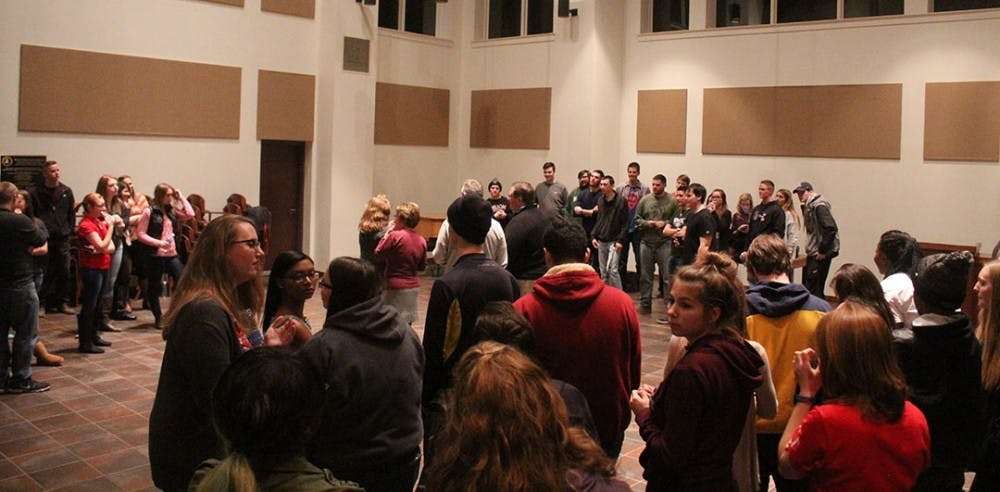More than 60 Shippensburg University students conducted a mock caucus at the Spiritual Center on Thursday, electing Bernie Sanders as the Democratic nominee and Marco Rubio as the Republican nominee.
SU students participate in the mock caucus every presidential election cycle and have accurately predicted every party nominee since its inception in 2008.
“Where goes SU, goes the nation,” said Alison Dagnes, an SU professor of political science. Dagnes said she first organized the mock caucus in 2008 when former SU President William Ruud called upon her to start one.
“It was really the energy of the Ship students and the leadership of Ali Dagnes driving our original caucus idea,” Ruud said. “Clearly the right thing to do at a university is learning and what a better way of learning [about] the caucus than by doing [one], and that’s what we did.”
Students enjoyed a variety of food and mingled together to get a feel for the political atmosphere before splitting up into preference groups, which are groups of students divided based on their candidate of choice. The first round of the caucus let students freely form a preference group for any presidential candidate.
For a group to continue into Round 2 it needed a viability threshold. The threshold is a minimum number of participants for a group to have to stay alive, and it encourages the smaller groups to compete for more people.
After about 15 minutes of debating who the best candidate is, the second round came to a close and the Republican and Democratic candidate was chosen based on which preference group had the most number of people.
SU freshman Zach Gates and sophomore Brandon Ferrance helped organize the event as members of the College Democrats and College Republicans, respectively. Gates and Ferrance said there was a great turnout and were happy to see a high number of non-political science majors in attendance.
“This is a great way for students to get to know the candidates,” Ferrance said.
The students soon became acquainted with a spectrum of candidates ranging from New Jersey Gov. Chris Christie to former Maryland Gov. Martin O’Malley. The first round of caucusing included supporters for Christie, business mogul Donald Trump, Sen. Marco Rubio, businesswoman Carly Fiorina, Ohio Gov. John Kasich, former Secretary of State Hillary Clinton, Sen. Bernie Sanders and O’Malley.
Additionally, there was a short-lived, two person strong preference group for Jesus Christ. Its members said they were actually leaning toward Clinton because they do not think Sanders has the experience or electability to become president — others disagreed.
“He’s kept his integrity, he brings up facts instead of attacking others and he fights for equality and human rights,” said SU freshman Sophia Severson. Severson, who was actively engaging other students in political discussions, was a strong advocate for Sanders, but also for the democratic process.
She said she came to the caucus because she thought it would be informational, and college is the place for people with different backgrounds to come together.
Students did come together, and many of them were there to support Rubio and Trump. They were the two Republicans that made it into the final round of caucusing, with Rubio beating Trump 19-16. Clinton narrowly beat O’Malley in the first round and lost to Sanders 21-8.
SU junior Nicholas Sones, who is trying to become a delegate for the Democratic National Committee, was caucusing for O’Malley as a better alternative to Sanders and Clinton.
“O’Malley has the record,” Sones said. “He got things done for the people of Maryland and now he will get things done for the people of America.”
Though Trump had a devoted following from the beginning, there was an equal number of students who opposed him. Colton Minnick, an SU student and member of the National Guard, said he is not political but he favors Rubio over Trump.
“I would kind of like Trump if he wasn’t so extreme,” Minnick said, explaining that he likes Rubio for his support of the military. Another student, Daniel Hank, said he is backing Trump because of his personal success and knowledge in the business world.
With elections underway, time will tell if SU’s track record of predicting the nominees will hold. SU political science professor Lonce Sandy-Bailey said he does not think Sanders can make it through the first weeks of the primary.
“If you really believe in your candidate, then get out there and support them,” SU President George “Jody” Harpster said, during his closing remarks. Dagnes also left students with a few calls to action.
“I want you, over spring break, to register to vote if you haven’t already,” Dagnes said, noting people have until March 28 to register to vote in Pennsylvania. “Get out there and vote.”




The Slate welcomes thoughtful discussion on all of our stories, but please keep comments civil and on-topic. Read our full guidelines here.